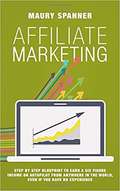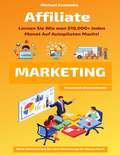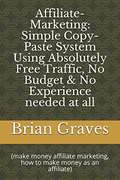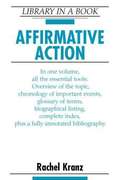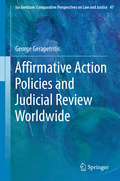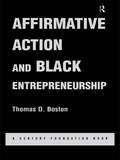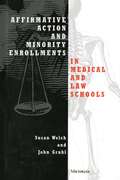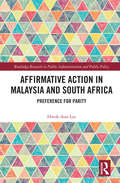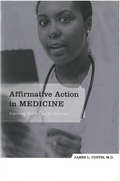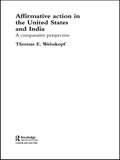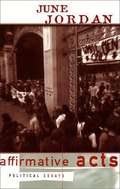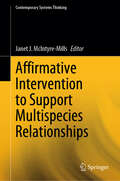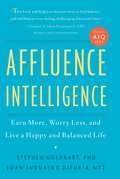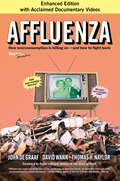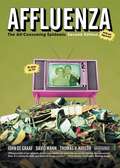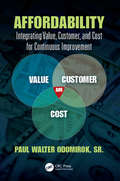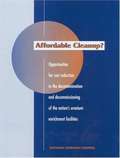- Table View
- List View
Affiliate Marketing: Come guadagnare €10.000 e oltre al mese senza fare niente! (Business And Money Ser.)
by Michael EzeanakaAmazon #1 Best Seller Stai cercando un'attività online che puoi iniziare già da oggi? Hai la sensazione di non riuscire a guadagnare online, anche se ci stai provando con tutte le tue forze? Se è così, questo libro può aiutarti e puoi leggerlo sul tuo pc, sul tuo Mac, sul tuo smartphone, table o Kindle! Questo metodo per guadagnare usando Internet è in voga da oltre due decenni e le persone ancora usano lo stesso modello di 20 anni fa. Questo libro ti insegnerà tutto ciò che devi sapere sull'affiliate marketing (o marketing di affiliazione), illustrandone la storia dall'inizio e la sua evoluzione fino a diventare l'industria multi miliardaria che è oggi. In questo libro vedremo come fare per ottenere la tua fetta della grande torta dell'affiliate marketing. Imparerai come iniziare con questo business e costruire le tue risorse di affiliate marketing da zero. Imparerai anche come sviluppare contenuti e attirare grandi quantità di traffico usando sia metodi organici (gratuiti) che a pagamento. Infine, approfondiremo diverse strategie su come fare per avere successo diventando un Internet marketer. Con l'aiuto di questo libro, sarai sulla buona strada per arrivare a un reddito mensile a sei cifre. Inizia oggi a costruire il tuo impero nell'affiliate marketing! Ecco come questo libro ti aiuterà. Sia che tu inizi da zero e non sappia nulla sull'affiliate marketing o che tu abbia già capito i concetti fondamentali, questo libro ti sarà estremamente utile. Grazie a questo libro, scritto in modo estremamente chiaro e con istruzioni passo passo, riuscirai a: Scoprire di che cosa si occupa l'affiliate marketing Scoprire come scegliere la nicchia di mercato che fa per te Scoprire i 20 migliori programmi di affiliate marketing Scoprire come costruire efficacemente una mailing list Scoprire come scegliere il miglior programma di affiliate marketing Scoprire come usare le piattaforme
Affiliate Marketing: Learn How To Make $10,000+ Each Month On Autopilot
by Michael EzeanakaThis book will teach you everything you need to know about affiliate marketing. It discusses how it all started and evolved to the multi-billion dollar industry that it is today. <p><p> In this book, we will discuss how you can get your slice of the affiliate marketing pie. You will learn how you can start with this business and build your affiliate marketing assets from scratch. You will also learn how to develop content and drive massive amounts of traffic to them through organic (free) and paid methods. <p> Lastly, we talk in depth about the different strategies on how you can become successful as an Internet marketer. With the help of this book, you will be on your way to earn a six-figure monthly income. <p> Start building your affiliate marketing empire today!
Affiliate Marketing: Step by Step Blueprint to Earn a Six Figure Income on Autopilot from Anywhere in the World, Even if You Have No Experience
by Maury Spanner<p>Offering products and services people actually want to buy and earning hefty affiliate commissions is a great way to start a real online business with little risk or investment - but only if you know how to do it right! Need to learn how to run a successful affiliate marketing campaign the right way? <p>With this guide you will be armed with the fundamental knowledge you need to succeed in the exciting world of affiliate marketing. You’ll also learn how to avoid making mistakes that could cost you a lot of money and waste your valuable time! <p>Even if you have no background in affiliate marketing or online business, have no fear! With this guide in your hands that will not be a barrier for you any longer. Learn how to successfully market products and services that people love while earning juicy affiliate commissions for yourself when you grab this guide now!</p>
Affiliate-Marketing: Lernen Sie Wie man $10,000+ Jeden Monat Auf Autopiloten Macht!
by Michael EzeanakaSind Sie auf der Suche nach einem Online-Geschäft, das Sie noch heute anfangen können? Dann ist Affiliate Marketing das Richtige für Sie. Diese Methode, über das Internet Geld zu verdienen, gibt es schon seit mehr als zwei Jahrzehnten, und die Menschen nutzen heute immer noch das gleiche Modell wie vor 20 Jahren. In diesem Buch werden wir besprechen, wie Sie Ihren Teil vom Kuchen abbekommen können. Sie werden lernen, wie Sie damit beginnen und Ihr Vermögen von Grund auf aufbauen können. Sie werden auch lernen, wie Sie die Inhalte entwickeln und durch organische (kostenlose) und bezahlte Methoden große Mengen an Traffic auf diese Seiten leiten können. Letztendlich sprechen wir über die Strategien, wie Sie als Internet-Vermarkter erfolgreich werden können und wie man mit Affiliate Marketing eine Menge Geld verdienen können. Machen Sie sich auf den Weg zu einem sechsstelligen Monatseinkommen. Beginnen Sie noch heute mit dem Aufbau Ihres Affiliate-Marketing-Imperiums!
Affiliate-Marketing: Simple Copy-paste System Using Absolutely Free Traffic, No Budget And No Experience Needed At All
by Brian GravesAnyone Can Do It! The Only Way to Fail is If YOU Don't Try! This is the easiest affiliate marketing system any newbie or serious online marketer could hope for! I found this particular company that pays big affiliate commissions in the dog niche. BUT what's even better, is that they do the follow-ups for you! Meaning, you don't have to mess with autoresponders, and you don't have to write any emails. Because, they do it for you. Every email they send contains your affiliate link... ...plus they send helpful daily dog training tips (...I know coz I subscribed to them)... ...and they offer different HOT products, and even monthly membership to their paid newsletter. It's really amazing because all you have to do is create a 10 sec UGLY video, with a single background photo, add background music YouTube provides for free .and insert your affiliate link in the video. That's it - I did not talk or show my face. And within that month, I got a commission from them. I continued making a few more videos (...coz they were so easy to do)... And in 2-3 months the commissions were coming in regularly. It really is as simple as that. I am going to take you through the entire process, step by step and then show you how to scale it up for even more profit. You don't want to miss out on this. Hit the buy button and get in now.
Affinity Labs, Inc.
by Liz Kind Joseph B. LassiterIn November 2006, Chris Michel left Military.com, which he founded in 1999, to start Affinity Labs, a global network of online communities. That month, Michel raised a Series A round of venture funding and established a partnership with Monster, which he had sold Military.com to. Within its first year of operations, Affinity Labs launched eight vertical portals including PoliceLink, NursingLink, TechCommunity, and IndiaOn. While the company was well ahead of its original plan to release four portals in 2007, Michel still faced a number of challenges. He had learned a great deal from Military.com and Affinity Labs' first launches, but in the case of each new community was faced with how best to construct the vertical and attract a sufficiently large audience. While the model seemed highly scalable because each vertical used the same core technology, every sector had its unique features. In the fall of 2007, executives from Monster opened up a dialogue with Michel about selling the company or expanding their relationship. Michel wondered if the time was right to sell or if he should grow Affinity Labs further with the hope of creating a company that could command the high valuations seen recently by a number of social networking concerns.
Affinity Plus (A)
by Peter Tufano Dennis CampbellThe executive team at Affinity Plus Federal Credit Union has pushed the concept of members first deeply throughout the organization, empowering employees to put member-owners' interests ahead of either the organization's interests or their own interests. As a result of this focus, the credit union must determine what to do with its profitable indirect auto lending business, which some see as inconsistent with the strategic direction set by the management team.
Affinity Plus: Priorities and Performance Pressures
by Dennis Campbell Kyle Thomas Tatiana SandinoCase
Affirmative Action
by Rachel KranzOne of the most controversial political issues of the past three decades has been the question of affirmative action. The phrase was first used in 1965 when President Lyndon B. Johnson issued Executive Order 11246.
Affirmative Action Policies and Judicial Review Worldwide (Ius Gentium: Comparative Perspectives on Law and Justice #47)
by George GerapetritisThis book discusses affirmative action or positive discrimination, defined as measures awarding privileges to certain groups that have historically suffered discrimination or have been underrepresented in specific social sectors. The book's underlying rationale is that one cannot place at the same starting point people who have been treated differently in the past because in this way one merely perpetuates a state of difference and, in turn, social gaps are exaggerated and social cohesion is endangered. Starting out with an introduction on the meaning and typology of affirmative action policies, the book goes on to emphasise the interaction of affirmative action with traditional values of liberal state, such as equality, meritocracy, democracy, justice, liberalism and socialism. It reveals the affirmative action goals from a legal and sociological point of view, examining the remedial, cultural, societal, pedagogical and economy purposes of such action. After applying an institutional narrative of the implementation of affirmative action worldwide, the book explains the jurisprudence on the issue through syntheses and antitheses of structural and material variables, such as the institutional recognition of the policies, the domains of their implementation and their beneficiaries. The book eventually makes an analytical impact assessment following the implementation of affirmative action plans and the judicial response, especially in relation to the conventional human rights doctrine, by establishing a liaison between affirmative action and social and group rights. . The book applies a multi-disciplinary and comparative methodology in order to assess the ethical standing of affirmative action policies, the public interests involved and their effectiveness towards actual equality. In the light of the above analysis, the monograph explains the arguments considering affirmative action as a theology for substantive equality and the arguments treating this policy as anathema for liberalism. A universal discussion currently at its peak.
Affirmative Action and Black Entrepreneurship
by Thomas D BostonThis volume isolates the cause of continuing disparities not only between blacks and whites, but amongst blacks as well. Key factors discussed include the current state of the economy the influence of public policies, the persistence of urban poverty, economic opportunities, changes in family and social structure and equal opportunities. The city o
Affirmative Action and Minority Enrollments in Medical and Law Schools
by Susan Welch John GruhlAffirmative action is one of the central issues of American politics today, and admission to colleges and universities has been at the center of the debate. While this issue has been discussed for years, there is very little real data on the impact of affirmative action programs on admissions to institutions of higher learning. Susan Welch and John Gruhl in this groundbreaking study look at the impact on admissions of policies developed in the wake of the United States Supreme Court's landmark 1978 Bakke decision. In Bakke, the Court legitimized the use of race as one of several factors that could be considered in admissions decisions, while forbidding the use of quotas. Opponents of affirmative action claim that because of the Bakke decision thousands of less-qualified minorities have been granted admission in preference to more qualified white students; proponents claim that without the affirmative action policies articulated in Bakke, minorities would not have made the gains they have made in higher education. Based on a survey of admissions officers for law and medical schools and national enrollment data, the authors give us the first analysis of the real impact of the Bakke decision and affirmative action programs on enrollments in medical and law schools. Admission to medical schools and law schools is much sought after and is highly competitive. In examining admissions patterns to these schools the authors are able to identify the effects of affirmative action programs and the Bakke decision in what may be the most challenging case. This book will appeal to scholars of race and gender in political science, sociology and education as well as those interested in the study of affirmative action policies. Susan Welch is Dean of the College of Liberal Arts and Professor of Political Science, Pennsylvania State University. John Gruhl is Professor of Political Science, University of Nebraska-Lincoln.
Affirmative Action and the Law: Efficacy of National and International Approaches
by Erica Howard Elvira Dominguez-Redondo Narciso Leandro Xavier BaezAffirmative Action and the Law analyses the practical application of affirmative action measures and their efficacy in achieving substantive equality through the lenses of the United Nations human rights machinery and the legal regime and policies implemented in China, India, Central and South America, South Africa and the United Kingdom. The product of a joint research project involving academics from the Brazil, Chile, Mexico, India, Spain and the United Kingdom, the findings identify and reflect on trends emerging from State practice across the world in eradicating structural inequality through special measures for certain designated groups. The book seeks to provide a coherent and systematic approach to the analysis of special measures in the targeted countries. It also comprises two case-studies with in-depth insights on gender diversity on the boards of public listed companies in the UK and the European Union and the access of persons with disabilities to higher education in Brazil. The book will be a valuable resource for students and academics in the field of human rights, law, sociology and politics. It will also provide a source of good practice for states and policy makers in the framing of responses to increased inequality at national and international level; and for civil society actors seeking to explore meaningful interaction with a highly controversial topic in society.
Affirmative Action in Malaysia and South Africa: Preference for Parity (Routledge Research in Public Administration and Public Policy)
by Hwok-Aun LeeMalaysia and South Africa implement the most extensive affirmative action programmes worldwide. This book explores why and how to effect preferential treatment which has been utilized in the pursuit of inter-ethnic parity, specifically in higher education, high-level occupations, enterprise development and wealth ownership. Through methodical and critical analyses of data on education, workforce and population, the book evaluates the primary objectives of increasing majority representation in education, employment, enterprise and ownership. The book also critically considers questions of the attainments and limitations of ethnic preferential treatment in reducing disparity, the challenges of developing capability and reducing dependency and the scope for policy reforms.
Affirmative Action in Medicine: Improving Health Care for Everyone
by James L. CurtisAffirmative action programs have significantly changed American medicine for the better, not only in medical school admissions and access to postgraduate training but also in bringing a higher quality of health care to all people. James L. Curtis approaches this important transition from historical, statistical, and personal perspectives. He tells how over the course of his medical education and career as a psychiatrist and professor--often as the first or only African American in his cohort--the status of minorities in the medical professions grew from a tiny percentage to a far more equitable representation of the American population. Advancing arguments from his earlier book, Blacks, Medical Schools, and Society, Curtis evaluates the outcomes of affirmative action efforts over the past thirty years. He describes formidable barriers to minority access to medical-education opportunities and the resulting problems faced by minority patients in receiving medical treatment. His progress report includes a review of two thousand minority students admitted to U. S. medical schools in 1969, following them through graduation and their careers, comparing them with the careers of two thousand of their nonminority peers. These samples provide an important look at medical schools that, while heralding dramatic progress in physician education and training opportunity, indicates much room for further improvement. A basic hurdle continues to face African Americans and other minorities who are still confined to segregated neighborhoods and inferior school systems that stifle full scholastic development. Curtis urges us as a nation to develop all our human resources through an expansion of affirmative action programs, thus improving health care for everyone. James L. Curtis is Clinical Professor Emeritus of Psychiatry, Columbia University College of Physicians and Surgeons.
Affirmative Action in the United States and India: A Comparative Perspective (Routledge Frontiers Of Political Economy Ser. #Vol. 56)
by Thomas E. WeisskopfArguably, two of the most important national experiences with policies of positive discrimination in favor of historically disadvantaged ethnic or caste minority groups are the cases of 'Affirmative Action' in the United States and 'Reservation Policies' in India. This essential new book examines the consequences of affirmative action in both count
Affirmative Acts: Political Essays
by June JordanAffirmative Acts: Political Essays marks the twenty-fifth book in the celebrated career of poet, essayist, activist, and professor June Jordan. The recipient of the Lila Wallace Reader's Digest and the PEN West Freedom to Write Awards, Jordan has created a widely influential and groundbreaking body of work over several decades. With the same clear-sighted passion found in her classic essay collections Civil Wars and Living Room, in Affirmative Acts Jordan writes brilliantly about controversial, critical, and timely issues that are currently at the center of American debate. Whether discussing the tragic dismantling of affirmative action; ruminating on the combustible intersections of race, class, gender, and injustice; reflecting on the palpable hatred that infuses American society; or speaking out against worldwide suffering, June Jordan paints, as in her previous works, what she calls "an intimate face of universal struggle."
Affirmative Intervention to Support Multispecies Relationships (Contemporary Systems Thinking)
by Janet J. McIntyre-MillsThis book offers a pioneering approach to collaborative co-authorship, integrating storytelling, participatory action research, and innovative uses of technology like Zoom to bridge geographical and cultural divides. The authors emphasize authentic dialogue, using a form of metalogue to ensure all voices are heard and respected, thus avoiding ventriloquy—speaking for or over others. Their praxis revolves around performative and regenerative projects involving indigenous custodians, academics, students, and community members, aiming to address "Species Apartheid" and promote a more inclusive and sustainable future. The book's engagement model includes inner work, focusing on critical analysis and analytical meditation on values and their consequences; outer work, involving transformative education and organic food production workshops to engage a broad community of practice; and future work, exploring narrative and "if-then" scenarios to envision new possibilities, with an emphasis on creativity and courage. The authors draw inspiration from diverse sources, including Indigenous knowledge systems and various academic institutes and organizations. Through their collaborative efforts, they aim to create a more inclusive, sustainable, and just world.
Affluence Intelligence: Earn More, Worry Less, and Live a Happy and Balanced Life
by Stephen Goldbart Joan DifuriaWe have just come through the worst recession many of us have ever seen, and in times like these, it's tempting to think that just having more money would solve our problems. Indeed, it is also widely believed that how wealthy you are is a result of external factors, such as job promotions or good investments. But the surprising truth is that affluence is actually based on a certain way of thinking, one which has never before been discussed. Now, after years of working with clients of all backgrounds--including billionaires--psychologists Stephen Goldbart and Joan DiFuria reveal the little-known concept of "Affluence Intelligence," a mindset that makes people not just wealthy but deeply fulfilled. The book includes a test to determine your Affluence Intelligence Quotient (AIQ), and a step-by-step program to raise that AIQ in just three months, for more money, more security, and more joy. Affluence Intelligence is for everyone who suspects they are devoting too much time to worrying about finances and too little time to living life.
Affluence, Austerity and Electoral Change in Britain
by Paul Whiteley Harold D. Clarke David Sanders Marianne C. Stewart Paul Whiteley Harold D. Clarke David SandersAffluence, Austerity and Electoral Change in Britain investigates the political economy of party support for British political parties since Tony Blair led New Labour to power in 1997. Using valence politics models of electoral choice and marshalling an unprecedented wealth of survey data collected in the British Election Study's monthly Continuous Monitoring Surveys, the authors trace forces affecting support for New Labour during its thirteen years in office. They then study how the recessionary economy has influenced the dynamics of party support since the Conservative-Liberal Democrat Coalition came to power in May 2010 and factors that shaped voting in Britain's May 2011 national referendum on changing the electoral system. Placing Britain in comparative perspective with cross-national survey data gathered in the midst of the worst recession since the 1930s, the authors investigate how the economic crisis has affected support for incumbent governments and democratic politics in over twenty European countries.
Affluenza: How Overconsumption Is Killing Us—and How to Fight Back
by David Wann Thomas H. Naylor John de GraafNEW EDITION, REVISED AND UPDATEDaffluenza, n. a painful, contagious, socially transmitted condition of overload, debt, anxiety, and waste resulting from the dogged pursuit of more.We tried to warn you! The 2008 economic collapse proved how resilient and dangerous affluenza can be. Now in its third edition, this book can safely be called prophetic in showing how problems ranging from loneliness, endless working hours, and family conflict to rising debt, environmental pollution, and rampant commercialism are all symptoms of this global plague. The new edition traces the role overconsumption played in the Great Recession, discusses new ways to measure social health and success (such as the Gross Domestic Happiness index), and offers policy recommendations to make our society more simplicity-friendly. The underlying message isn't to stop buying—it's to remember, always, that the best things in life aren't things.
Affluenza: The All-Consuming Epidemic
by John De Graaf David Wann Thomas H. NaylorAffluenza uses the metaphor of a disease to tackle a very serious subject: the damage done- to our health, our families, our communities, and our environment-by the obsessive quest for material gain. The author's show that problems like loneliness, rising debt, longer working hours, environmental pollution, family conflict and rampant commercialism are actually symptoms caused by the same "disease" affluenza.
Affordability of National Flood Insurance Program Premiums: Report 2
by Engineering Medicine National Academies of SciencesWhen Congress authorized the National Flood Insurance Program (NFIP) in 1968, it intended for the program to encourage community initiatives in flood risk management, charge insurance premiums consistent with actuarial pricing principles, and encourage the purchase of flood insurance by owners of flood prone properties, in part, by offering affordable premiums. The NFIP has been reauthorized many times since 1968, most recently with the Biggert-Waters Flood Insurance Reform Act of 2012 (BW 2012). In this most recent reauthorization, Congress placed a particular emphasis on setting flood insurance premiums following actuarial pricing principles, which was motivated by a desire to ensure future revenues were adequate to pay claims and administrative expenses. BW 2012 was designed to move the NFIP towards risk-based premiums for all flood insurance policies. The result was to be increased premiums for some policyholders that had been paying less than NFIP risk-based premiums and to possibly increase premiums for all policyholders. Recognition of this possibility and concern for the affordability of flood insurance is reflected in sections of the Homeowner Flood Insurance Affordability Act of 2014 (HFIAA 2014). These sections called on FEMA to propose a draft affordability framework for the NFIP after completing an analysis of the efforts of possible programs for offering “means-tested assistance” to policyholders for whom higher rates may not be affordable. BW 2012 and HFIAA 2014 mandated that FEMA conduct a study, in cooperation with the National Academies of Sciences, Engineering, and Medicine, which would compare the costs of a program of risk-based rates and means-tested assistance to the current system of subsidized flood insurance rates and federally funded disaster relief for people without coverage. Production of two reports was agreed upon to fulfill this mandate. This second report proposes alternative approaches for a national evaluation of affordability program policy options and includes lessons for the design of a national study from a proof-of-concept pilot study.
Affordability: Integrating Value, Customer, and Cost for Continuous Improvement (Continuous Improvement Series)
by Paul Walter Odomirok, Sr.Affordability is a new concept that allows the implementation of Continuous Improvement for any organization. It encapsulates contemporary methods that improve product and service profitability, increases market share, value, speed, quality and capability, and cuts down on cost. This new method addresses the needs of growing, improving, and sustaining an organization. It provides a framework and foundation for launching improvement initiatives, deploying continuous improvement, and maintaining the cultural habits and behaviors required to continue such efforts. Case studies from a variety of industries, businesses, and institutions are provided.
Affordable Cleanup?: Opportunities for cost reduction in the decontamination and decommissioning of the nation's uranium enrichment facilities
by Committee on Decontamination Decommissioning of Uranium Enrichment FacilitiesThe Energy Policy Act of 1992 called on the National Academy of Sciences to conduct a study and provide recommendations for reducing the costs of decontaminating and decommissioning (D&D) the nation's uranium enrichment facilities located at Oak Ridge, Tennessee; Raducah, Kentucky; and Portsmouth, Ohio. This volume examines the existing plans and cost estimates for the D&D of these facilities, including such elements as technologies, planning and management, and identifies approaches that could reduce D&D costs. It also assesses options for disposition of the large quantities of depleted uranium hexafluoride that are stored at these sites.


